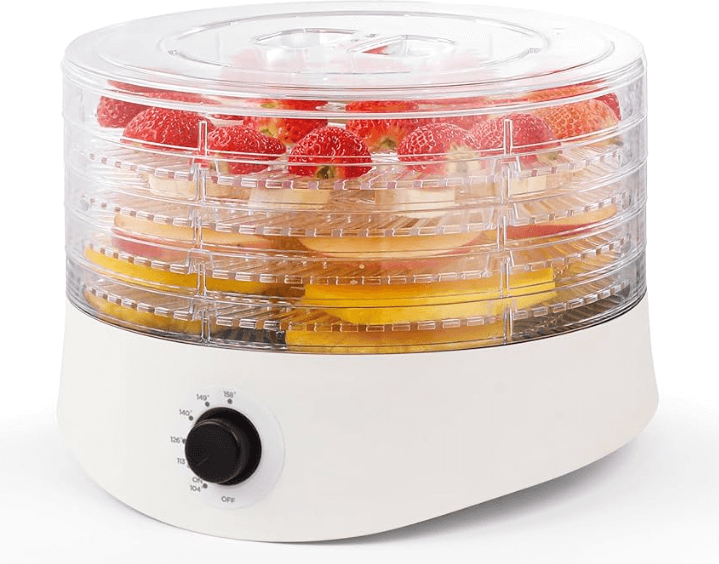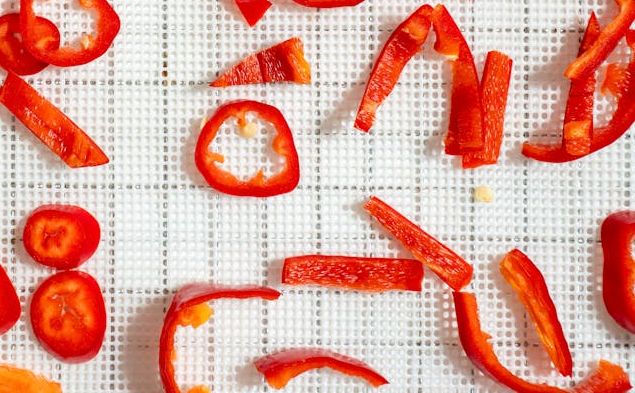In the realm of procuring exceptional food processing apparatus, one must not trivialize the acquisition of a premium dehydrator. Its significance transcends mere gadgetry to become an advocate for a salubrious way of life. This is attributable to its prowess in maintaining comestibles in their nutrient-rich state over extended durations, eradicating moisture to minimize decay, all while conserving essential vitamins and minerals. Ostensibly, it could emerge as a laborious endeavor to pinpoint the preeminent dehydrator across NZ’s market landscape teeming with myriad brands and models.
The commitment towards securing an elite brand becomes indispensable when aiming for optimal results from food desiccation processes. Many are often found querying: “Which ones make up the crème de la crème of food dehydrators?” This question emanates from cognizance about the pivotal role that this device undertakes in culinary operations. Celebrated brands such as Excalibur, Sedona, and BioChef have continually been industry trailblazers by fabricating deluxe dehydrators that amalgamate dependability, effectiveness, and durability. Their offerings reverberate with tenets of superior artisanship coupled with technological progression rendering them apt for both domestic and commercial applications.
Diving into the World of Food Dehydration
The tantalizing prospect of sinking your teeth into a piece of succulent, dehydrated pineapple or munching on healthy kale chips could provoke an intriguing question in the mind of a novice – what would constitute the perfect first-time dehydrator? The quest for an appropriate beginner’s dehydrator necessitates careful consideration of several variables like simplicity to operate, cost-effectiveness and performance. Ideally, a debutant’s dehydrator should simplify the dehydration process yet deliver consistent outcomes without causing significant dent to one’s finances especially when they are merely testing the waters.
In addition, relevant inquiries might surface such as – is it worthwhile to own a dehydrator? The worthiness of this investment largely depends upon myriad factors including personal lifestyle choices, dietary habits and aspiration for achieving food autonomy. Possessing a home-based food-dehydration system can dramatically augment household capacity for long-term food preservation thereby minimizing waste generation and pocket pinch while opening up opportunities to enjoy numerous homemade nutritious snacks. Once armed with requisite knowledge about their functionality and benefits, navigating through world of food dehydration becomes less daunting but rather more exhilarating experience.
Here are some factors to consider when looking for the perfect first-time dehydrator:
- Simplicity: As a beginner, you would want your dehydrator to be easy to operate. Look for models that have simple controls and straightforward instructions.
- Cost-effectiveness: You don’t want to spend an arm and a leg on something you’re just starting out with. Choose a model that is reasonably priced but still delivers good results.
- Performance: Your dehydrator should be efficient in removing moisture from food without altering its taste or nutritional value. This means it should maintain consistent heat levels throughout the dehydration process.
When deciding whether owning a food dehydrator is worthwhile, here are questions one might ponder:
- Lifestyle choices: Do you lead an active lifestyle where homemade snacks could provide convenient nutrition? Or perhaps you’re interested in sustainable living practices – if so, reducing food waste through dehydration could align well with your values.
- Dietary habits: Are there dietary restrictions or preferences that make store-bought snacks less appealing? With a home-based food-dehydration system, you can control exactly what goes into your snacks ensuring they meet your specific dietary requirements.
- Food autonomy aspirations: If achieving greater control over what you eat is important to you, then having the ability to preserve and prepare foods at home can contribute significantly towards this goal.
Understanding how these machines work and their benefits will help make navigating the world of food dehydration less intimidating and more exciting. Here’s why:
- Long-term preservation capacity enhancement: Owning a dehydrator can dramatically increase your household’s ability for long-term storage of fruits, vegetables and meats thereby minimizing waste generation.
- Pocket-friendly nutritious snacking options creation opportunity : Dehydration allows making homemade healthy snack options like fruit leathers or vegetable chips which not only cater personal taste preference but also save money in comparison buying them pre-packaged from stores .
In conclusion, diving into the world of food dehydration can be a rewarding experience, offering numerous benefits from healthier snacking options to increased food autonomy and waste reduction.
Features to Consider when Choosing a Dehydrator
As you wade through the labyrinth of considerations swirling around the query, “What factors dictate my choice of a dehydrator?”, several crucial elements come bubbling to the surface. Amidst the kaleidoscope of features demanding your scrutiny, key aspects that loom large include – capacity quotient, heat and airflow typology, construction materials employed, tray characteristics, thermostat range’s breadth, presence or absence of a timer function, simplicity in cleaning process and last but not least – its impact on your wallet. Each facet plays an indispensable role in shaping up the overall performance metrics and lifespan longevity of this machine thus making them vital pivots upon which your decision should rest.
Among culinary aficionados in New Zealand one brand emerges from this perplexing maze with honour – Excalibur Dehydrator NZ. This name embodies quality within food dehydration circles due to its trademark blend of ample capacity space coupled with consistently uniform heat diffusion and meticulously engineered trays. The models under this brand’s umbrella put on offer benefits like manipulatable thermostats for achieving pinpoint temperature accuracy essential for peak dehydration results. Adding another feather to their cap is an ingenious air-flow system operating horizontally thereby eliminating rotation requirement for trays hence simplifying dehydration chore while concurrently ensuring uniformly dried out products at every attempt.
Comparing Top Dehydrator Models Available in New Zealand

In the sphere of food preservation, an apt selection of a dehydrator is paramount and New Zealand’s marketplace teems with options. Amidst the plethora of brands and models on offer, certain ones have ascended as market leaders due to their superior quality and notable features. A duo stands out in this domain – Sunbeam Food Dehydrator and the Generic Dehydrator accessible at the Warehouse.
The Sunbeam Dehydrator has captured hearts across New Zealand, from home cooks to gastronomy fans. Its popularity can be attributed to its five-tray design that amplifies airflow for uniform and efficient drying. The meticulous temperature control ensures just-right conditions for diverse food types. In contrast, dehydrators available at The Warehouse are celebrated for their budget-friendly price tag without sacrificing essential elements like adjustable temperatures or timer settings which aid precise dehydration process management. Moreover, these models boast user-friendliness making them ideal candidates for beginners embarking on culinary adventures within economic constraints.
When one juxtaposes popular choices like Sunbeam Dehydrator against those proffered by The Warehouse considering feature sets and specifications; it becomes clear that there exists versatility catering to varying needs and demands in the market landscape. This assortment affords consumers freedom in selecting a high-quality dehydrator aligning perfectly with their preservation requirements regardless if they lean towards fruits, vegetables, meats or herbs.
Benefits of Using a High-Quality Food Dehydrator
Immerse yourself in the realm of elevated food preservation by investing in an advanced tool; none other than the Biochef Dehydrator NZ. This top-of-the-line dehydrator holds the power to ensure your food retains a staggering 97% of its nutrients during dehydration – a stark contrast to traditional cooking and preservation methods which are notorious for nutrient loss. As such, this extraordinary dehydrator becomes your gateway to a healthier lifestyle, offering you access to nutrient-laden dried fruits, vegetables and meats.
In addition, owning a dependable dehydrator like the Biochef bestows upon you an invitation into adventurous preparation styles via exciting Dehydrator Recipes NZ. From simple delights like dried kiwi slices or crunchy banana chips to more intricate concoctions such as homemade beef jerky; your culinary imagination will be set alight with endless possibilities. Further still, when facilitated by high-calibre equipment such as this, food dehydration can lead directly towards significant savings on grocery bills over time. Consider purchasing fruits and vegetables en masse; dehydrate them using your trusted Biochef device and relish their enduring freshness for months at leisure.
How to Optimize Use of Your Dehydrator
In the burgeoning landscape of food dehydration practices, both in homely kitchens and bustling commercial establishments, extracting every ounce of efficiency from your dehydrator is a pivotal step towards achieving mastery. Whether you’re an amateur gastronome or a seasoned culinarian, leveraging your gadget to its utmost can markedly enhance the quality of your final produce.
A prime example echoes in the form of farmers dehydrator – a model that has won hearts across the verdant lands of New Zealand. Its users often express wonderment at its ability to steadfastly maintain efficacy even with continuous usage over extended periods. This characteristic when maneuvered appropriately can be nothing short of a golden opportunity for those enthusiastic culinary explorers who rely heavily on this piece of kitchen technology for their innovative creations.
On another note, amongst many competitors vying for attention stands Devanti dehydrator NZ – an embodiment of advanced technology promising top-notch performance under diverse conditions. It not only takes pride in sturdy and long-lasting build but also incorporates features designed with user comfort in mind ensuring smooth operation. However, understanding how to navigate through its settings and applying them aptly to specific dehydration tasks could be what sets apart your dehydration endeavors from others’. A comprehensive grasp on factors such as ideal temperature suited for different food items, correct drying time frame, and regular machine upkeep can significantly amplify both usability and longevity factor of your appliance.
Recipes and Ideas for Your New Dehydrator
As you clutch your new dehydrator, consider yourself armed and ready to embark on a galactic journey of gastronomic wonder. The power to expel moisture from food unveils infinite opportunities for ground-breaking recipe creation; let us plunge into some that might pique your interest initially. From constructing wholesome nibbles within the comfort of home to preserving elements for intricate meals, your dehydrator holds the potential to overhaul culinary proceedings.
Consider this: fashioning crisp vegetable chips is no longer an ordinary task. When contrasted with store-acquired alternatives, homemade veggie chips are not merely more nourishing but also open to personalization. You hold the reins when it comes to flavorings and spices, permitting dehydration of diverse vegetables such as carrots, beetroot or even kale without constraint. Moreover, contemplate the craftsmanship involved in fruit leathers – pureed fruit thinly spread and stripped off moisture – a healthier spin-off from conventional candy brimming with fresh fruit goodness. Or maybe you’re inclined towards old-school methods like dehydrating herbs or spices? Air-drying fresh herbs like basil, mint or rosemary could yield an aromatic stash beneficial for cooking endeavors.
FAQ
An exceptional grade dehydrator is pivotal in ensuring food undergoes even dehydration, thus preserving its nutritional essence and boosting taste. Conversely, an inferior quality unit may fail to dry food uniformly, leading to wasted edibles and potential health hazards.
Crucial factors include overall size and capacity, number of trays, customizable temperature settings, integrated timer functionality, and ease-of-cleaning. It’s equally crucial to consider what foods you intend to dehydrate as specific machines excel with certain types of produce.
A handful of distinguished options include Excalibur 3926TB, Nesco Snackmaster Pro along with Cosori Premium Food Dehydrator. Each model offers bespoke features catering towards diverse dehydration needs.
Employing such allows the extension of your food’s shelf life while conserving its nutritional worth. Moreover it presents an economical method for creating wholesome snacks like fruit chips or jerky at home.
Dehydration results can be optimized through trial-and-error with various foods and preparation methods. Furthermore adherence to appropriate temperatures for different items alongside uniform slicing ensures both proper placement on trays and enhanced drying process.
Most dehydrator trays are safe for dishwasher use, alternatively washing with warm soapy water is also effective. Key areas to focus on during the cleaning process include the base where food remnants accumulate. Regular checks of fan function and heating components should be part of your maintenance routine.
The majority of edible items can safely undergo dehydration; caution is recommended when considering dairy products or eggs due their inherent bacterial growth potential. Certain fruits like oranges or bananas might underperform expectations owing to their high moisture content.












+ There are no comments
Add yours